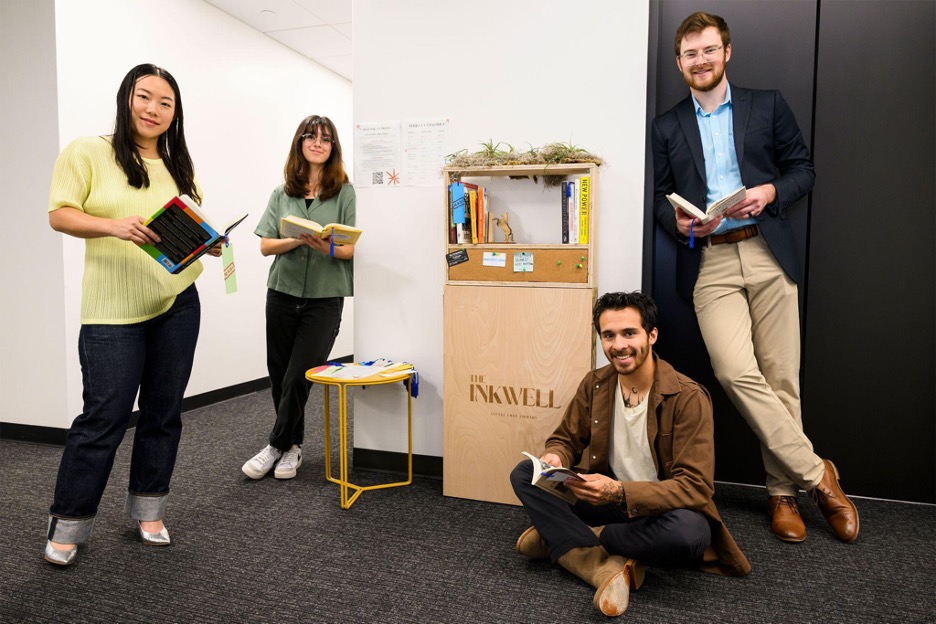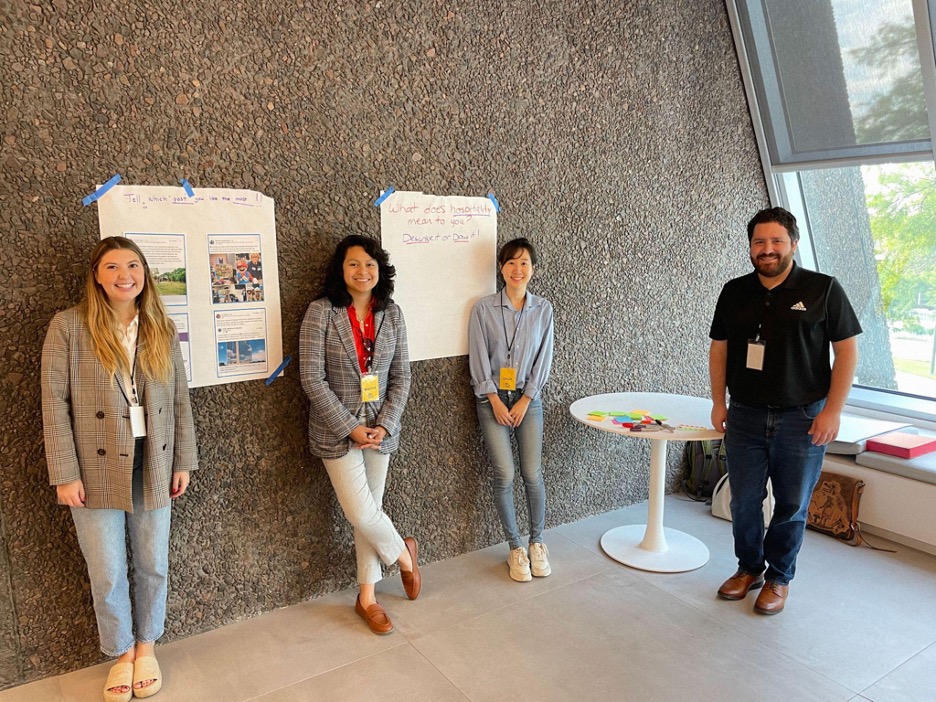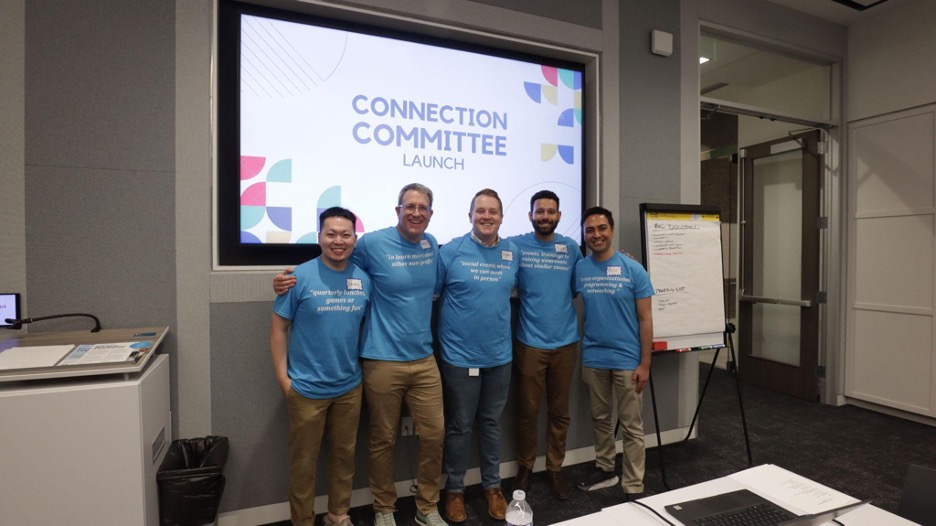SMU’s MADI program delivers Human-Centered Design solutions for social impact organizations at Pegasus Park
Dallas' Pegasus Park leaders recently turned to students of SMU's unique Master of Arts in Design and Innovation (MADI) program to help reimagine how they might collaborate with their Water Cooler neighbors.

Lyda Hill Philanthropies’ ambitious vision to create a cost-subsidized Water Cooler community for social impact organizations within Dallas’s Pegasus Park became a reality in 2022. This effort, with The Dallas Foundation as a managing partner, enabled more than 30 local non-profits to begin moving to the 26-acre headquarters for entrepreneurial startups and biotech industry leaders.
Water Cooler’s nonprofit and philanthropic tenants are co-located among five floors and approximately 175,000 square feet within Pegasus Park’s 18-story tower, making it one of the largest nonprofit shared spaces in the country. These high-performing organizations were not only navigating a new office space, ongoing challenges within the social sector, and an ever-changing workplace environment, but also a desire to reimagine how they might collaborate with their Water Cooler neighbors. For that, Pegasus Park leaders turned to students of SMU's unique Master of Arts in Design and Innovation (MADI) program for help.
“Once Water Cooler tenants got into their new spaces – there was not a lot of tactical clarity on, ‘How do we do this? How do we create this culture of collaboration?’” says Justin Childress, Clinical Assistant Professor in MADI at SMU Lyle School of Engineering.
As a program, MADI challenges students to address extraordinary problems in the world by working through the Human-Centered Design problem-solving process through hands-on learning opportunities brought about with partnerships with organizations across the DFW Metroplex. Students focus on the importance of qualitative research behind design decisions that lead to innovation. In 2023 alone, MADI graduates worked on issues ranging from public safety and awareness, collaboration across large institutions, and developing a strategic direction for vacant public land.
“We believe that design is everywhere,” says Jessica Burnham, director of MADI and Clinical Assistant Professor at SMU Lyle School of Engineering. “We believe that design deserves a seat at every table, but you have to get it there. We will bring it to the students in the program through the projects and partnerships, but the expectation is that [the students] turn it around and say, ‘Okay, here's what I care about, and here's where I want to take design to the next level.’ That could be in project management, entrepreneurship, the social sector, or in government and policy. It could be in a lot of different spaces. This is what we aimed to do for Water Cooler tenants at Pegasus Park.”
Pegasus Park is an office campus designed to strengthen biotech, corporate innovation, and social impact efforts. The campus consists of more than 750,000 square feet across multiple buildings and features state-of-the-art facilities and amenities. It is located between the Dallas Design District and the Southwestern Medical District, minutes away from downtown Dallas. Over 30 Water Cooler tenants receive subsidized rent, access to donated funds for infrastructure and office furnishings, curated programming, and free or low-cost amenities and services. The office space includes a mix of full and partial-floor tenants and a co-working suite for smaller organizations.
In the spring of 2023, Water Cooler at Pegasus Park challenged MADI students to answer the question: “How might we establish an environment of collaboration for Water Cooler tenants within Pegasus Park?” Approaching this problem from a Human-Centered Design perspective, three design teams engaged in an intensive sixteen-week process of both secondary research and fieldwork to gain a thorough understanding of all the actors, factors, and issues involved in this challenge. At the conclusion of the semester, each team delivered their findings and recommendations to the client and discussed how each effort could live on in the future.
The class was split into three student teams that focused on space, services, and programs. Each student design team pursued research around workplace collaboration, social sector real estate development, and themes such as awareness, hospitality, and trust. During the initial project briefing, the teams learned Water Cooler tenants had worked in the space for less than a year, and many organizations were still navigating how hybrid and remote work was impacting their teams and individual employees. In fact, this was a new office space for all the organizations.
The team tasked with reimagining spaces focused their work around activating existing shared spaces throughout the offices such as the break room, printer room, foyers, and hallways. Ultimately, the team questioned how the Water Cooler might utilize these spaces to drive awareness to inspire future collaboration between tenants. Through their primary research, the teams observed what spaces were being used and how they were being used, identified the highest-traffic areas, and worked to understand how far people might be willing to travel from their work areas to spend time in their preferred community spaces.
Based on their learnings, the team took inspiration from libraries as places that utilize space interactively to build community and promote a culture of collaboration through shared values. For their prototype, the team designed and built from scratch a community library called The Inkwell to activate passive areas throughout the office for future collaboration and camaraderie.
The team tasked with reimagining services identified a desire for a digital community to help connect Water Cooler tenants. The initial challenge in testing a digital prototype was understanding adoption and selecting a low-fidelity testing platform. The Water Cooler Community LinkedIn Group provided a digital context to test content sharing, increase access to information, and facilitate connections. The team invited people to join the LinkedIn Group, and designed, curated, and posted content to help create rhythms and consistency for community building.
Finally, the team tasked with program development focused on how different programs could enhance an environment of collaboration. The teams defined programming as a system that builds an offering of virtual and in-person events intended to foster engagement and collaboration in the Water Cooler community. In the research phase, the teams specifically focused on the themes of trust, awareness, and rhythm. To explore these themes, the team prototyped a Connection Committee, a volunteer-led group tasked with planning future programs at the Water Cooler. The prototype included three main elements: committee selection, a promotional info session, and the committee launch meeting. The culminating element of the prototype was the Committee Launch Meeting. The meeting lasted two hours, had nine attendees who participated in three brainstorming exercises, and concluded with the scheduling of two future committee events.
In working to design solutions for all Water Cooler tenants and community members, the comprehensive and supplementary approach of exploring spaces, services, and programs yielded a number of successful recommendations for Water Cooler management to consider implementing including physical spaces and digital spaces for engagement and systems for future collaboration all aligned with the tenants needs and desires. By designing and testing at a human scale and in a way that leverages iterative prototyping, the student teams learned how community members would respond to these initiatives as they grow in scale. “Our teams cumulatively interacted with well over 200 people at the Water Cooler over the course of about four weeks,” Childress says. “They also are expected to do extensive secondary research, which leads to primary research and interactions. We take the academic rigor of our program seriously, and we think the true value of MADI is that our students learn how to interact with people, and how to identify and address their needs.” Burnham says the Pegasus Park project highlights the purpose of the MADI program – to bring a design approach that puts humans at the center of everything in our world, whether tangible or intangible. “We're teaching students who do not necessarily have a design background in the Human-Centered Design process so that they are equipped with tools and structure to solve problems in a creative and needs-based way,” says Burnham.
The 2023 semester project was successful in discovering what works and what doesn’t in fostering collaboration among nonprofits housed in the same office space, largely due to MADI’s emphasis on the creation of evidence-based solutions to real-world problems and the need to understand how the things we create can work better for those who use them. According to Margaret Black, Managing Director of Lyda Hill Philanthropies, “Lyda Hill Philanthropies and The Dallas Foundation share in the belief that co-location is just the first step towards more impactful collaboration. SMU MADI students helped us build on this foundation through design thinking and delivered valuable, creative, and actionable plans within a single academic semester.” Launched in 2015, the MADI program is a collaboration between the Lyle School of Engineering and the Meadows School of the Arts. The program is open to students with any background, regardless of whether they see themselves as designers or not and relies on students bringing their previous experience to the Human-Centered Design process to launch into their next big career. MADI is designed to be a two-year, full-time graduate program in Human-Centered Design that teaches the value of the design process in any field and enables the practice of empathy for clients and teams while exploring ambiguity to find meaningful solutions. The focus of the program is abandoning assumptions for evidence, Burnham says. And seeing that students can apply the methods and tools that they are learning in real-time with real projects. “MADI provides a creative problem-solving side that is fluid and adaptive but also backed with rigorous support,” she says. The bridge between the arts and engineering is design, and what designers create must be both beautiful and functional while solving a human need, she adds. The MADI program also has a Designer-in-Residence program and the SMU Design Council membership program. Past MADI semester projects have involved organizations such as Paul Quinn College, the Trinity Park Conservancy, the Retina Foundation of the Southwest, Dallas College, the International Rescue Committee, the Dallas Police Department, the Dallas Mavericks, Southwest Airlines, and DFW Airport. Childress says that MADI graduates all have in common a desire to better society. When they graduate and leave the classroom environment to enter the professional world, he says they carry with them the responsibility to bring about the betterment they wish to see in the world.
“Whenever people leave, I want them to leave with this great care for humans and understand the gravity of the potential impacts that we can have as designers on people and on society.”
For more information about the MADI program, upcoming events, and a repository of client projects, visit their website at smu.edu/MADI.
SMU’s Lyle School of Engineering, founded in 1925, is one of the oldest engineering schools in the Southwest. The school offers twelve undergraduate and 29 graduate programs, including master’s and doctoral degrees, in the departments of Civil and Environmental Engineering; Computer Science; Electrical and Computer Engineering; Mechanical Engineering and Operations Research and Engineering Management.
About SMU
SMU is the nationally ranked global research university in the dynamic city of Dallas. SMU’s alumni, faculty and nearly 12,000 students in eight degree-granting schools demonstrate an entrepreneurial spirit as they lead change in their professions, community and the world.


